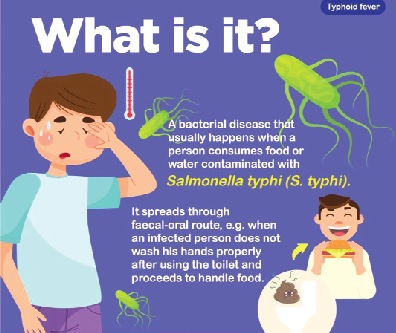
Do you really have typhoid disease?
If there is any particular disease that a lot of people agree to suffer from, then it is typhoid fever. But when probed further, they admit to all kinds of symptoms except fever.
They only refer to the disease as typhoid. What they forget is that the disease, they claim to be suffering from, is known as typhoid fever.
Thus, without the symptoms of fever, it is highly unlikely that one will be suffering from typhoid fever.
Typhoid fever is a febrile condition caused by bacteria known as salmonella typhi. Like Malaria, it is usually an acute condition, meaning the disease is of recent onset, from which you will recover immediately, with treatment, or you may suffer the consequences, without treatment.
Acute illnesses are usually of short duration as opposed to chronic diseases, which last more than six months. Thus, the fact that some people can claim to have had typhoid fever continuously for several months or even years is, simply, worrying.
The bacteria are usually present in the intestines of human beings and transmitted from one person to another through the faecal-oral route, which implies that typhoid fever, also called enteric fever, is acquired through the ingestion of food and water contaminated with faecal matter, containing the organism.
Although nobody will ever admit to ingesting faecal matter, this is highly possible when one buys and eats uncovered food, which has been visited by houseflies and cockroaches, who have the habit of visiting exposed faecal matter and settling on uncovered food.
An infected person who visits a public washroom and gets hands contaminated with faecal matter can also spread the disease to other people if proper handwashing measures are not practised.
Symptoms
Symptoms of typhoid fever include abdominal pains, joint pains, headache, skin rashes, general weakness and, of course, a very high fever.
The diagnosis of typhoid fever is made based on symptoms and confirmed by a positive laboratory test, the widal test or typhoid antibody test.
People who have encountered the bacteria but are not showing the disease are called typhoid carriers. Although they are asymptomatic, they can spread the organism from one person to another by contamination, as described above.
Another disease known as paratyphoid fever is caused by bacteria known as Salmonella Paratyphi. The presentation is similar to typhoid fever but is usually less severe and less common.
Typhoid fever is a fairly common condition. In Ghana, it is estimated that approximately 200 people are infected every day.
Complications
Untreated, typhoid fever can lead to a lot of serious complications, including septicemia and typhoid perforation of the intestines, which is a surgical emergency, with high mortality.
Therefore, early reporting to a health facility upon the slightest suspicion of typhoid fever is advised.
Preventive measures are mainly observation of general personal and environmental hygiene.
Foods must be hygienically prepared and covered all the time and not be allowed to be contaminated by houseflies and cockroaches. Fruits and vegetables that are eaten raw must be properly washed before eating.
As much as possible, food that has been left to become cold must be heated and eaten hot to ensure that any bacteria that had settled on the food are destroyed before eating.
Ensuring good drinking water and screening food handlers for signs of infection will go a long way to reducing the incidence and outbreak of typhoid fever.
The writer is Medical Director,
Royal Medical Agency and Clinic.
E-mail:
